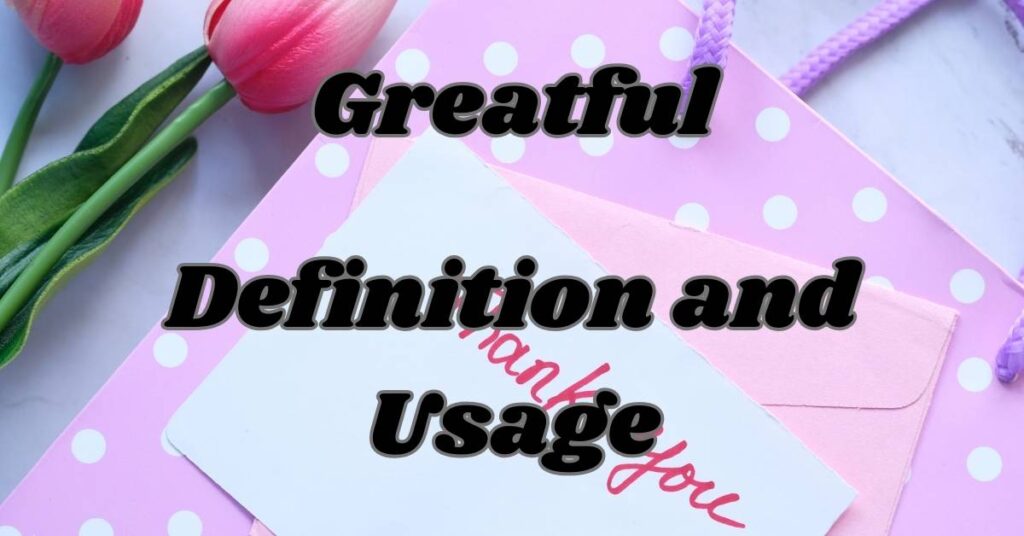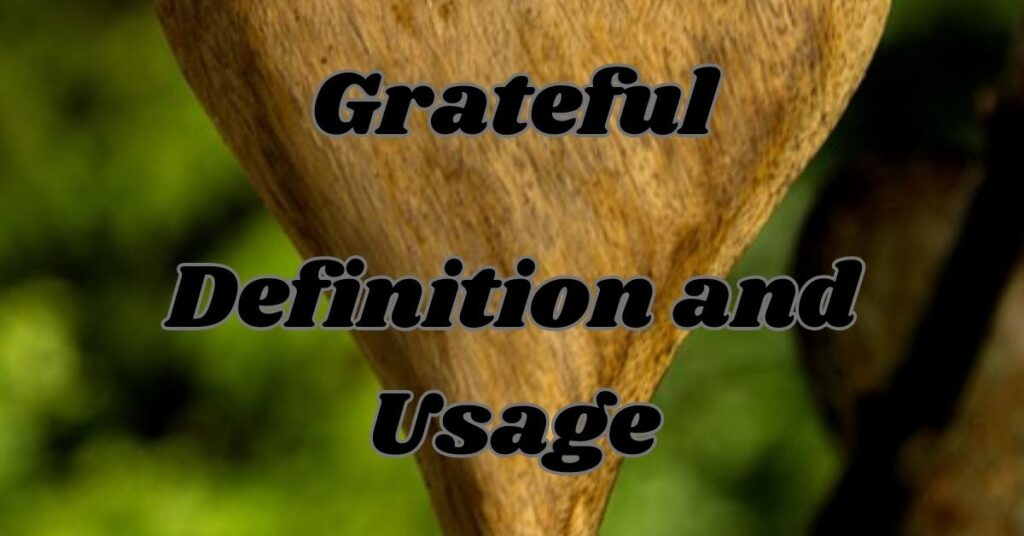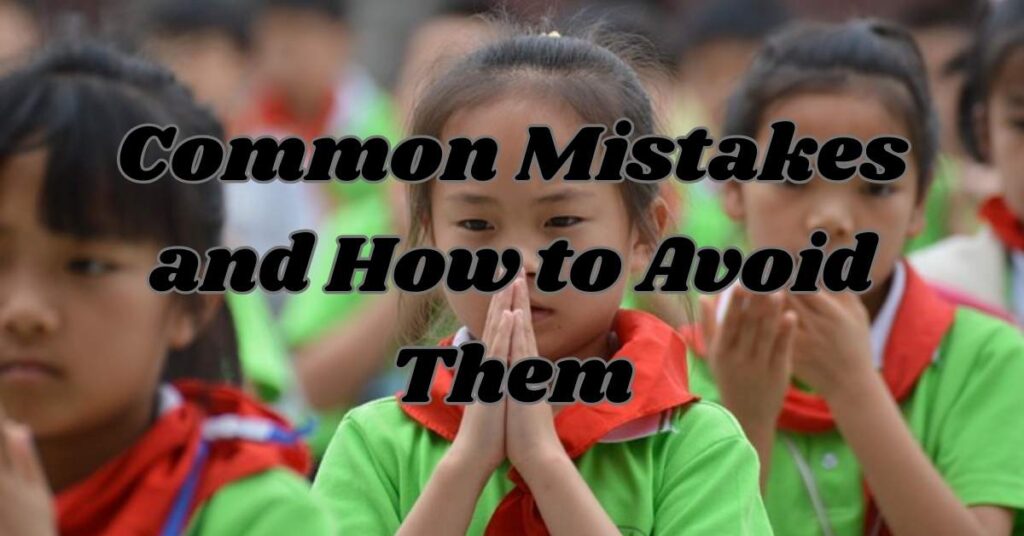Greatful or Grateful can often confuse many people, leading to common misspellings and misunderstandings. While grateful is the correct term, meaning thankful or appreciative, greatful does not hold any meaning in the English language.
This article will delve into the origins, usage, and meanings of these two words to help you express your feelings of gratitude accurately. Understanding the distinction between grateful and its incorrect counterpart will enhance your communication skills and ensure you convey your appreciation clearly.
Join us as we explore the nuances of gratitude in language and provide practical examples to help you use grateful correctly in your writing and conversations.
Quick Summary
In the debate of Greatful vs Grateful, the correct term is grateful, which means feeling thankful or appreciative. Many people mistakenly use greatful, thinking it is a valid word, but it has no meaning in English.
Understanding this difference is crucial for clear communication. Using grateful properly allows you to express your appreciation effectively, ensuring your messages resonate with sincerity and clarity.
Understanding Greatful or Grateful

Understanding the difference between greatful vs grateful is crucial for effective communication. While grateful is the correct term that conveys feelings of thankfulness, greatful is simply a misspelling with no meaning.
Recognizing this distinction helps prevent confusion in both writing and speech. By consistently using grateful, you can ensure that your expressions of gratitude are clear and meaningful, enhancing your interactions with others.
Origins of the Grateful
The word grateful originated in the 1550s, meaning “pleasing to the mind” and “full of gratitude.” It comes from the obsolete adjective grate, meaning agreeable, which is derived from the Latin gratus, meaning pleasing.
Unlike thankful, which emphasizes immediate acknowledgment of a favor, grateful conveys a deeper sense of appreciation and readiness to express that feeling through actions, even long after receiving kindness.
Remember the Latin Root “Gratus”
Understanding the Latin root “gratus” can help you remember why grateful is spelled this way. Since “gratus” conveys feelings of pleasure and thankfulness, it aligns perfectly with how we use “grateful” today.
Greatful: Definition and Usage

Greatful is a common misspelling of the correct word grateful. It holds no definition in the English language and should be avoided in both writing and speech.
Using greatful can lead to confusion and miscommunication, as it does not convey any meaning related to appreciation or thankfulness. Instead, always opt for grateful to express feelings of gratitude accurately and effectively.
Greatful Meanings
Since greatful is not a recognized word, it has no meaning associated with it. This misspelling often occurs due to phonetic similarities with other words. It is essential to remember that the correct term is grateful, which signifies a feeling of thankfulness or appreciation.
By understanding that greatful lacks meaning, you can avoid using it and enhance your communication skills.
Greatful Usage
Using greatful in writing or conversation can lead to misunderstandings and errors. Since it is an incorrect spelling, it’s best to replace it with grateful, which accurately conveys feelings of thankfulness.
Many people mistakenly use greatful, thinking it is a valid term, but this can diminish the clarity of your message. Always double-check your writing to ensure you use the correct form, enhancing your communication.
Grateful: Definition and Usage

Grateful is an adjective that describes a feeling of thankfulness or appreciation. It signifies a recognition of kindness or support received from others. For instance, you might say, “I am grateful for my friends.”
This usage effectively communicates your appreciation. Understanding how to use grateful correctly allows you to express your emotions clearly and connect with others on a deeper level.
Grateful Meanings
Being grateful encompasses various meanings related to appreciation and recognition of kindness. It reflects an emotional state where one acknowledges the positive impact others have had on their life.
For example, someone might feel grateful for a friend’s support during tough times. This term not only describes the feeling but also implies a readiness to express that appreciation through words or actions, fostering stronger relationships.
How to Write a Grateful Thank You Note
Writing a thank you note is a wonderful way to express your gratitude. Start with a warm greeting, mention what you are thankful for, and conclude with a heartfelt closing statement.
For example, you could write: “Dear [Name], I am grateful for your support during my recent project. Your help made a significant difference.”
Fun Facts About “Grateful”
The concept of gratefulness has fascinating implications for our well-being. Research shows that expressing gratitude can lead to improved mental health, reducing feelings of anxiety and depression.
It also enhances relationships by fostering a sense of connection and appreciation between individuals. Interestingly, keeping a gratitude journal has been linked to better sleep quality and overall happiness.
By acknowledging the positives in life, we train our brains to focus on joy, making gratitude a powerful tool for emotional resilience.
How to Use Gratefully
Using the term gratefully is straightforward and enhances your expressions of appreciation. It serves as an adverb that describes how you receive something with thankfulness. For example, you might say, “I gratefully accepted the help offered by my friends.”
This sentence conveys both your appreciation and the manner in which you accepted assistance. Incorporating gratefully into your vocabulary can enrich your communication, making it more heartfelt and sincere.
Synonyms of Grateful
You can use synonyms for grateful in its place.
- Thankful
- Appreciative
- Obliged
- Blessed
- Indebted
- Beholden
- Glad
- Contented
- Satisfied
- Appreciative-hearted
Side by Side Comparison
To clarify further:
| Term | Correctness | Definition |
| Greatful | Incorrect | No definition |
| Grateful | Correct | Feeling or showing gratitude |
This table illustrates that only grateful holds meaning in English.
Why is “Greatful” Incorrect?
Greatful is incorrect because it is a common misspelling of the word grateful. This error arises from phonetic similarities but lacks any recognized meaning in English. Understanding that greatful does not exist helps prevent confusion in written and spoken language.
It’s essential to use the correct spelling, grateful, to convey feelings of thankfulness accurately. By avoiding this mistake, you enhance clarity in your communication.
Everyday Usage Examples

In daily conversations, using grateful correctly can strengthen your connections with others. For instance, you might say, “I am grateful for your support during my difficult times,” or “She felt grateful for the kind gesture.”
These examples clearly express appreciation and foster positive interactions. Incorporating grateful into your language allows you to communicate your feelings effectively and encourages a culture of thankfulness in your relationships.
Examples of Gratefully in Sentences
Here are some examples showcasing how to use gratefully in sentences: “He gratefully accepted the award for his hard work,” or “They gratefully acknowledged the help they received.”
These sentences illustrate how to express appreciation through actions or words effectively. Using gratefully adds depth to your communication, emphasizing the thankful nature of your response and enhancing the emotional impact of your message.
Examples of “Grateful” in Sentences
To demonstrate proper usage of grateful, consider these sentences: “I am grateful for all the love and support from my family,” or “She felt grateful after receiving such thoughtful gifts.” Both examples convey a clear sense of appreciation and highlight the importance of recognizing kindness from others.
By using grateful effectively, you communicate your feelings authentically, fostering stronger connections with those around you.
Grateful Example To Show Thankfulness
An excellent way to show thankfulness could be: “I am grateful for your kindness during tough times.” This sentence conveys deep appreciation.
Grateful Example To Express Appreciation
You could express appreciation by saying: “I am truly grateful for everything you’ve done.” This statement highlights sincere gratitude towards someone’s efforts.
Grateful Example To Recognize Generosity
To recognize generosity effectively: “We are grateful for your generous donation.” This sentence acknowledges someone’s kindness directly.
Common Phrases with “Grateful”
Several common phrases incorporate the word grateful, enhancing expressions of appreciation. For example, you might say, “I’m forever grateful,” to emphasize lasting thankfulness, or “Gratefully yours,” in the closing statement of a letter.
Other phrases include “Feeling grateful” and “Grateful for your support.” Using these expressions can enrich your communication, allowing you to convey heartfelt emotions and strengthen your connections with others through shared feelings of gratitude.
Common Mistakes and How to Avoid Them#

A frequent mistake people make is confusing grateful with greatful, which is incorrect. To avoid this error, always double-check your spelling when writing. Using grammar tools or spell checkers can help catch mistakes before finalizing your work.
Additionally, practicing the correct usage of grateful in sentences can reinforce its proper spelling in your mind. By being mindful of these common pitfalls, you can enhance your writing clarity and effectiveness.
How Can I Remember the Correct Spelling?
To remember the correct spelling of grateful, associate it with its Latin root, “gratus,” which means pleasing or thankful. You can also break it down into parts: “great” plus “full” may seem logical, but it’s misleading.
Instead, think of grateful as a unique word that conveys appreciation. Creating a mnemonic, like “I am grateful for my great friends,” can further help reinforce the correct spelling in your memory.
More Article: To Bad or Too Bad: Which One Is Best to Use?
FAQs: Greatful or Grateful
Is “Greatful” Ever Correct?
No, greatful is a common misspelling of grateful and is not recognized as a correct word in English.
Can I Use “Grateful” Instead of “Thankful”?
Yes, while both words express appreciation, grateful often conveys a deeper sense of thankfulness for kindness received.
Is it thankful or grateful?
Both terms are correct, but grateful specifically refers to a feeling of appreciation, while thankful emphasizes immediate acknowledgment.
Why is it Called Grateful?
The term grateful derives from the Latin word “gratus,” meaning pleasing or thankful, reflecting a sense of appreciation for kindness.
Conclusion
Understanding the difference between Greatful or Grateful is essential for clear communication. While grateful accurately conveys feelings of thankfulness and appreciation, greatful is simply a misspelling with no meaning.
By consistently using the correct term, you enhance your writing and ensure your expressions of gratitude resonate with sincerity. Embracing the proper usage of grateful not only improves your language skills but also fosters deeper connections with others by effectively communicating your appreciation for their kindness.
Related Post: Foremen or Foreman: What’s the Difference

